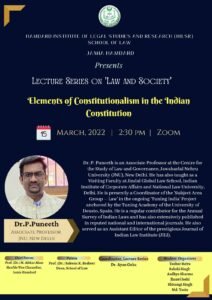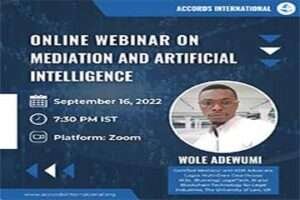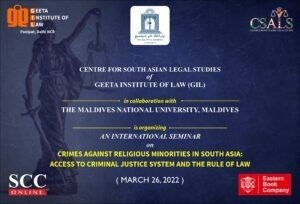9th Cartal Conference On International Commercial Arbitration
Table of Contents
- About the Institution
- About the Conference
- About CARTAL
- About IJAL
- Eligibility for the Paper Presentation
- Themes
- Submission Guidelines
- How to Submit?
- Deadline
- Awards
- Contact:
National Law University, Jodhpur is making a call for abstracts for its 9th CARTAL Conference on International Arbitration, 2025 to be held on 22-23rd March, 2025.
About the Institution
National Law University, Jodhpur [“NLUJ“] is one of India’s premier law schools established under the National Law University, Jodhpur Act, 1999 legislated by the State Government of Rajasthan. Nestled in the culturally vibrant city of Jodhpur, the Blue City, NLUJ is committed to the advancement of knowledge and learning, in furtherance of its vision to become a centre for excellence in legal studies.
About the Conference
The 9th CARTAL Conference on International Arbitration, 2025 organised by the Centre for Advanced Research and Training in Arbitration Law [“CARTAL“] is being conducted in a paper presentation and panel discussion format in collaboration with Jus Mundi and Kluwer Arbitration as our knowledge partners.
Previously, the Conference has hosted prominent luminaries in the sphere of arbitration such as Hon’ble Mr. Justice B. N. Srikrishna (Former Judge, Supreme Court of India), Hon’ble Mr. Justice Madan B. Lokur (Judge, Supreme Court of Fiji), Prof. Marike Paulsson (Director, University of Miami School of Law’s International Arbitration Institute), Prof. (Dr.) Petra Butler (Dean of Law at the University of Canterbury), and many more. The Conference has, in the past, been conducted in association with Baker McKenzie, Linklaters, and the SAARC Arbitration Council, besides other institutional partners. The foregoing editions witnessed a plethora of guest speakers from notable firms and arbitral institutions such as Afridi & Angell, Al Tamimi & Co., Clifford Chance, Homburger, Hughes Hubbard & Reed, Linklaters, King & Spalding, and King & Wood Mallesons, to name a few. The conference aims to provide students with a comprehensive understanding of the principles and practices of international arbitration, blending theoretical knowledge with practical insights from leading experts in the field.
About CARTAL
CARTAL was established by National Law University, Jodhpur to advance research and scholarship in the specialized legal domain of arbitration law. The Centre aims to equip students with both theoretical and practical knowledge of arbitration by creating a platform where academicians, professionals, and students can engage in discussions on contemporary arbitration law issues. In furtherance of its mandate, the Centre organizes workshops, conferences, and guest lectures that enhance the understanding of these topics. Additionally, the Centre publishes the Indian Journal of Arbitration Law [“IJAL“] bi-annually.
About IJAL
IJAL is a bi-annual, open-access and double-blind peer reviewed publication, recognised widely as a prominent source of literature on dispute resolution, with a focus on transnational debates as regards to international commercial arbitration and investment treaty arbitration. The Journal has successfully published twelve volumes, regularly hosting contributions from globally renowned experts, and is indexed on HeinOnline, Kluwer Arbitration, Westlaw as well as SCC Online. The articles published in IJAL have, inter alia, been referred to in the Report of the High-Level Committee to Review Institutionalization of Arbitration Mechanism in India constituted under the chairmanship of Justice B.N. Srikrishna, Federal Court of Australia’s website, Submission of the European Federation for Investment Law and Arbitration to the UNCITRAL Working Group No. III on ISDS Reforms, UN Secretariat’s note on Bibliography of recent writings related to the work of UNCITRAL, ICC Digital Library. Additionally, IJAL has been cited in Nakul Dewan’s “Enforcing Arbitral Awards in India,” Jan Paulsson and Georgios Petrochilos’ “UNCITRAL Arbitration,” Anselmo Reyes and Weixia Gu’s “The Developing World of Arbitration: A Comparative Study of Arbitration Reform in the Asia Pacific,” and several other noteworthy works.
Eligibility for the Paper Presentation
CARTAL invites academicians, research scholars, practitioners, and students of law pursuing their LL.B. (Hons.)/LL.B./LL.M. from any recognized university to submit their entries on any of the following themes.
Themes
Individuals desiring to participate in the paper presentation are encouraged to bring a diverse perspective to the subject matter, while also considering a wide range of issues related to arbitration. The submissions should be contemporary and relevant, showcasing in-depth research and excellent scholarly standards. The themes for this year’s conference are as follows:
- Revolutionizing Arbitration with Emerging Technologies
- Institutional Arbitration: Navigating Legal Frameworks and Enhancing Procedural Efficiency
The following sub-themes may be discussed under the above-mentioned general head:
a) AI in Arbitration: Leveraging artificial intelligence for faster and more accurate decision-making.
b) Blockchain for Arbitration: Ensuring transparency and security in arbitration processes using blockchain technology.
c) Virtual Hearings and E-Arbitration: The rise of remote arbitration proceedings and its impact on access to justice.
d)Data Analytics in Arbitration: Using big data to improve case management and predict arbitration outcomes.
e) Cybersecurity in Arbitration: Protecting sensitive data in tech-enabled arbitration processes.
f) Regulatory Challenges for Tech-Enabled Arbitration: Navigating the legal frameworks and standards for tech-driven arbitration.
g) Role of Institutional Support in Complex Arbitrations: How institutions handle multi-party or multi-contract cases.
h) Standardization of Arbitration Rules: Impact of unified procedural guidelines on global arbitration efficiency.
i) Innovations in Case Management: Technology and tools to streamline procedural efficiency in institutional arbitration.
j) Jurisdictional Challenges in Institutional Arbitration: Navigating cross-border legal frameworks and harmonizing international standards.
k) Appointment of Arbitrators: How institutions ensure neutrality and expertise in arbitrator selection.
l) Balancing Costs and Efficiency: Institutional strategies for controlling arbitration costs while maintaining procedural effectiveness.
m) Confidentiality v. Transparency in Institutional Arbitration: Addressing the tension between privacy and public accountability.
Please note that the list of sub-themes is only indicative in nature, participants are welcome to write on other sub-themes provided they fit within the broader theme.
Submission Guidelines
- CARTAL seeks submission under the following category:
a) Long articles – 7000 – 10,000 words*
* The word limit is exclusive of abstract and footnotes.
- The manuscript must be original and previously unpublished work.
- Co-authorship of maximum two authors is allowed.
- The manuscript must contain a short title and an abstract of not more than 300 words.
- The manuscript must be in conformity with the Bluebook: A Uniform System of Citation (21st edition).
- The manuscript must not contain any mention of or reference to the author’s name, affiliation or credentials.
- The acceptable limit of plagiarism is 10%, and that for AI usage is 20%. Manuscripts with plagiarism and/or AI usage exceeding these thresholds will be outrightly rejected.
- The manuscript should be on A4-sized paper, in Garamond, font size 12, 1.5 line spacing, justified and 1 inch margin on each side. Footnotes should be in Garamond, font size 10, and with single line spacing.
- The manuscript must be contained in a Microsoft Word (.doc/.docx) document.
How to Submit?
All submissions must be completed by filling our abstract submission form, available here.
Deadline
- Deadline for Submission of Abstracts: November 25, 2024
- Notification of Acceptance of Abstracts: December 7, 2024
- Deadline for Submission of Final Manuscripts: February 9, 2025
- Notification of Selected Manuscripts: February 28, 2025
- Closing date of registration: March 7, 2025
For Selection Procedure, refer to our brochure here.
Awards
- Winner(s):
• Cash prize
• Internship opportunities
• Certificate(s) of merit
• 3 months of access to the premium paid version of Jus Mundi
- Top 6 Entries:
• The submitted manuscript may be considered for publication in the upcoming special volume of IJAL (Vol. XIII, Issue 2) and may also be considered for publication in a book subject to the review process carried out by the editorial board
• Certificate of merit
Additionally, all participating teams can request up to 3 days of trial access to Jus Mundi.
Contact:
In case of any queries, you may contact us at ijal@nlujodhpur.ac.in or alternatively at +91 8454867872.




